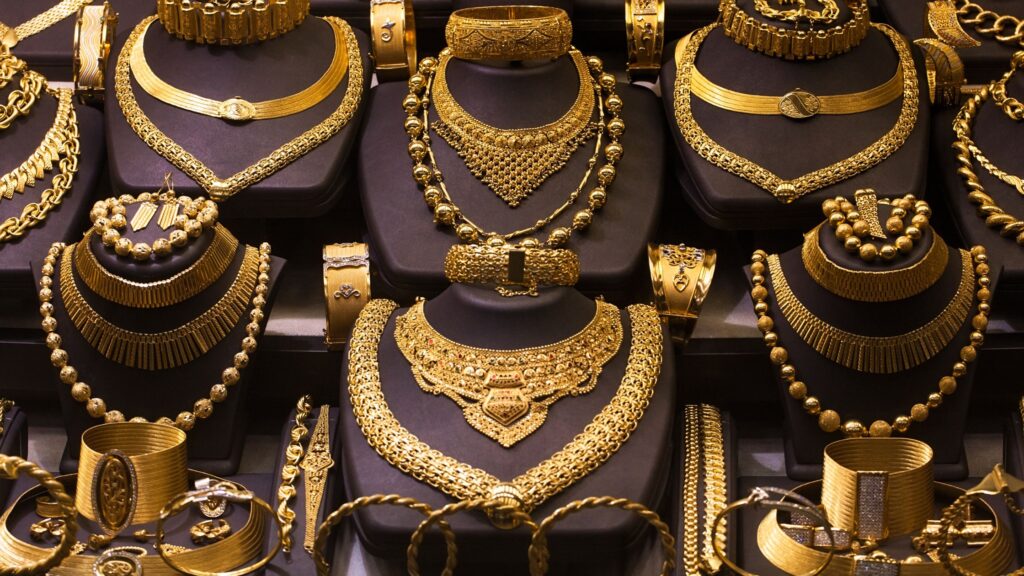In a country where economic uncertainty and naira volatility are constant concerns, many Nigerians are turning to gold as a reliable store of value. But here’s the million-naira question: should you invest in gold bullion or gold jewellery? Both options have their merits, but understanding their differences could make or break your investment strategy.

Understanding Gold as an Investment
Before diving into the comparison, let’s establish why gold remains attractive to Nigerian investors. Historically, gold has served as a hedge against inflation and currency devaluation, two challenges that Nigerians face all too frequently. Since the U.S. ended the gold standard in 1971, gold has maintained its role as a safe haven asset, often appreciating when traditional currencies lose value.
Gold’s investment appeal isn’t new. The precious metal has served as a store of value for over 4,000 years. Modern gold investing gained prominence after 1971, when President Nixon ended the U.S. dollar’s convertibility to gold, effectively ending the gold standard era. Since then, gold has demonstrated its value during major economic disruptions:
- The 1970s inflation crisis saw gold prices soar
- The 2008 financial crisis drove investors to gold as a safe haven
- Recent global uncertainties, including the COVID-19 pandemic and geopolitical tensions, have pushed gold to record highs
For Nigerian investors, gold’s track record during currency devaluations and economic instability makes it particularly relevant. To those watching the naira’s fluctuations against the dollar, gold offers a tangible alternative that isn’t tied to any single government’s monetary policy. This implies that understanding the gold market is crucial for long-term wealth preservation.
What is Investment Gold (Bullion)?
Investment gold refers to gold bars, coins, and bullion specifically purchased for their metal content and investment potential. These products typically contain 99.9% pure gold (24-karat) and are recognized globally for their standard purity and weight.
Gold bullion come in these popular forms:
- Gold bars: Available in various sizes from 1 gram to several kilograms
- Gold coins: Such as American Eagles, Canadian Maple Leafs, or South African Krugerrands
- Gold certificates: Paper documents representing gold ownership without physical possession

Advantages of Gold Bullion
Higher Purity and Value
Investment gold offers maximum purity, typically 99.9% gold content. This means you’re paying for gold, not copper, silver, or other alloy metals. When you buy a 10-gram gold bar, you’re getting 10 grams of nearly pure gold.
No VAT on Purchase
Here’s a significant advantage for Nigerian investors: investment gold is typically VAT-free. This immediately makes your investment more cost-effective compared to jewellery, where you pay VAT on the entire purchase price, including craftsmanship costs.
Superior Liquidity
Gold bullion enjoys excellent liquidity globally. Whether you’re in Lagos, Kano, or even traveling abroad, gold bars and recognized coins can be easily sold to dealers, banks, or precious metal specialists. The pricing is transparent and based on current spot gold prices.
Lower Transaction Costs
When you buy investment gold, you’re primarily paying for the metal content plus a small premium. There are no design costs, craftsmanship fees, or artistic markups that significantly inflate the price.
Better Resale Value
Since bullion is valued primarily by weight and purity, it typically maintains a higher percentage of its purchase price when resold. You’re not losing money on design elements that may go out of fashion.
Disadvantages of Gold Bullion
Storage and Security Concerns
Physical gold requires secure storage, which can be expensive. You’ll need a safety deposit box, home safe, or secure storage facility. In Nigeria’s security environment, this is a legitimate concern that adds to your investment costs.
No Aesthetic or Cultural Value
Unlike jewellery, you can’t wear gold bars to social events or cultural ceremonies. For many Nigerians, gold jewellery serves both investment and social functions.
Minimum Investment Amounts
Quality gold bars often require larger initial investments compared to small pieces of jewellery, potentially making them less accessible to beginning investors.
What is Jewellery Gold?
Gold jewellery combines precious metal with craftsmanship to create wearable items like chains, bangles, rings, and traditional Nigerian pieces like coral beads with gold accents. Jewellery gold typically ranges from 14-karat (58% gold) to 22-karat (92% gold), with 18-karat (75% gold) being common.
Advantages of Gold Jewellery
Dual Purpose
Gold jewellery serves as both an investment and a functional accessory. You can wear your investment to weddings, religious ceremonies, or business events while maintaining its underlying value.
Cultural and Social Significance
In Nigerian culture, gold jewellery often represents status, tradition, and family heritage. It’s commonly given as wedding gifts, passed down through generations, and worn during significant celebrations.
Easier Small-Scale Trading
Individual pieces of jewellery can be sold or traded more easily than large gold bars. If you need quick cash, selling a gold chain might be simpler than finding a buyer for a 100-gram gold bar.
Inflation Hedge with Style
Like all gold, jewellery provides protection against inflation while allowing you to enjoy its beauty and craftsmanship.

Disadvantages of Gold Jewellery
Lower Gold Content
Most jewellery contains 75% (18K) or less pure gold, mixed with other metals for durability and color variation. This means you’re paying gold prices for non-gold materials.
High Making Charges
Nigerian jewellers typically charge 15-25% above gold value for craftsmanship, design, and retail markup. These costs are rarely recoverable when reselling.
Fashion and Style Risks
Jewellery designs can become outdated, potentially reducing resale value regardless of gold content. A trendy design today might look dated in ten years.
Valuation Challenges
Determining the exact gold content and fair resale price can be difficult. Unlike standardized bullion, each piece of jewellery is unique, making pricing less transparent.
Storage and Insurance Costs
Like bullion, jewellery requires secure storage and insurance, but it may be more difficult to store efficiently due to irregular shapes and delicate designs.
Market Considerations for Nigerian Investors
Currency Hedge Gold is priced in U.S. dollars globally. This provides Nigerian investors with a hedge against naira devaluation. When the naira weakens against the dollar, gold investments typically maintain or increase their naira value.
Import and Regulatory Factors Nigerian investors should be aware of import duties, customs regulations and documentation requirements when purchasing gold. Working with reputable dealers who understand local regulations is crucial.
Local Market Dynamics While international gold prices provide a baseline, local supply and demand factors in Nigerian markets can affect pricing, especially for jewellery.
Making Your Decision: Bullion or Jewellery?
The choice between gold bullion and jewellery depends on your specific goals and circumstances:
Choose Gold Bullion If:
- Your primary goal is wealth preservation and investment returns
- You want maximum gold content for your money
- You’re comfortable with secure storage arrangements
- You prefer transparent, liquid investments
- You’re investing substantial amounts (₦500,000+)
Choose Gold Jewellery If:
- You want to combine investment with personal enjoyment
- Cultural and social factors are important to you
- You’re starting with smaller amounts
- You prefer assets you can use while they appreciate
- You value the craftsmanship and aesthetic appeal
Consider a Mixed Approach:
Many successful Nigerian gold investors combine both strategies. They might hold gold bullion as their core precious metals investment while owning some high-quality jewellery for personal use and cultural occasions.

Practical Tips for Nigerian Gold Investors
- Buy from Reputable Dealers: Whether choosing bullion or jewellery, work with established, licensed dealers who provide proper documentation and certificates of authenticity.
- Understand Total Costs: Factor in purchase premiums, storage costs, insurance, and potential resale fees when calculating returns.
- Start Small: Begin with affordable amounts to understand the market before making larger investments.
- Focus on Quality: Whether buying bars or jewellery, prioritize recognized brands and higher purity levels.
- Plan for Storage: Secure storage is non-negotiable. Budget for safety deposit boxes or high-quality home safes.
Conclusion
Both gold bullion and jewellery have roles in a diversified investment strategy. For pure investment purposes, bullion offers superior purity, liquidity,and cost-effectiveness. For investors who value dual-purpose assets that combine investment potential with cultural significance and personal enjoyment, quality gold jewellery can be worthwhile. The key is aligning your choice with your investment goals, budget, and personal preferences. In Nigeria’s dynamic economic environment, gold in either form provides valuable diversification and protection against currency volatility.
Remember, successful gold investing requires patience, proper storage, and a long-term perspective. Whether you choose the pure investment approach of bullion or the dual-purpose appeal of jewellery, gold can play a valuable role in preserving and growing your wealth over time.
Always consult with financial advisors and conduct thorough research before making significant investment decisions.












